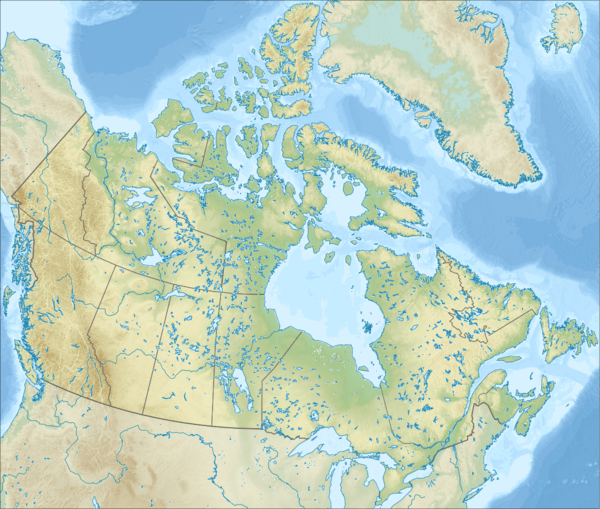Mount Steele
| Mount Steele | |
|---|---|
 | |
| Elevation | 5,073 m (16,644 ft)[1] |
| Prominence | 813 m (2,667 ft)[1] |
| Parent peak | Mount Lucania |
| Location | |
 Mount Steele | |
| Range | Saint Elias Mountains |
| Coordinates | 61°05′35″N 140°18′38″W / 61.09306°N 140.31056°WCoordinates: 61°05′35″N 140°18′38″W / 61.09306°N 140.31056°W[2] |
| Topo map | NTS 115F/01 |
| Climbing | |
| First ascent | 1935 by Walter Wood & party[1] |
| Easiest route | glacier/snow/ice climb |
- For the mountain in Antarctica, see Mount Steele (Antarctica).
Mount Steele is the fifth highest mountain in Canada and the eleventh highest peak in North America reaching the height of 5,073 metres (16,644 ft). A lower southeast peak of Mt. Steele stands at 4,300 m (14,108 ft).
It was named after Sir Sam Steele, the North-West Mounted Police officer in charge of the force in the Yukon during the Klondike Gold Rush.[1]
First ascent in 1935
Walter A. Wood led a team consisting of Foresta Wood (Walter's wife), Swiss guide Hans Fuhrer, Joseph W. Fobes, Harrison Wood and I. Pearce Hazard. The expedition approached the peak on the eastern side from Kluane Lake. Base camp was established at the foot of the Steele Glacier with horses carrying loads to Advance Base Camp (known as Camp 6) further along the glacier. ABC provided good views of the mountain and the team decided on the east ridge as their line of ascent.[2]
After waiting for the weather to improve after heavy snowfalls, a four man team consisting of Walter Wood, Harrison Wood, Fuhrer and Forbes left Camp 8 at the base of the ridge. Their plan to was to make a 2,440 m (8,005 ft) push to the summit. After steady upwards progress, deteriorating weather forced them to return to Camp 8 where they waited out a five day storm which dumped over a metre of fresh snow. They started out again on August 15 and the ascent was made easier this time by windblown and hard steep snow slopes rather than steep soft snow on their earlier attempt. At 4,570 m (14,990 ft), a plateau of wretched snow forced the team to crawl on all fours. Walter Wood commented:[2]
The humour of it impressed me. Here were four supposedly normal human beings crawling across a snow field 15,000 ft. up in the air, engaged in what they fondly believed to be a sporting venue.
Alternating the lead every 100 paces, they made their way from the plateau to the top, finally reaching the summit at 2:30 pm. The team enjoyed a blissful thirty minutes of windless conditions on top before beginning their descent.[2]
See also
- 4000 metre peaks of Canada
- 4000 metre peaks of North America
- Mountain peaks of Canada
- Mountain peaks of North America